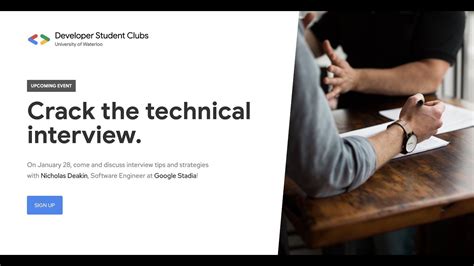Cracking Technical Interview Questions: Expert Tips

Technical interviews can be intimidating. They often involve complex questions and require you to think on your feet. However, with the right preparation and mindset, you can ace your technical interview and land your dream job. In this post, we’ll provide expert tips on how to crack technical interview questions.
1. Understand the Company and Job Requirements
Before your interview, research the company and job requirements. This will help you understand the company’s culture, values, and expectations. It will also help you tailor your responses to fit the company’s needs.
- Research the company’s website and social media profiles to learn about its products, services, and mission.
- Read the job description carefully to understand the required skills and qualifications.
- Research the industry and competitors to gain a broader perspective.
2. Review Your Technical Skills
Make sure you have a solid understanding of the technical skills required for the job. Review your resume and the job description to identify the technical skills you need to know.
- Practice coding problems and algorithms to improve your technical skills.
- Review technical concepts and terminology related to the job.
- Prepare to explain your technical experience and projects in detail.
3. Practice Technical Interview Questions
Practice answering technical interview questions to improve your confidence and communication skills. You can use online resources, practice with friends, or work with a technical coach.
- Use online resources such as LeetCode, HackerRank, or CodeSignal to practice coding problems and algorithms.
- Practice answering common technical interview questions such as “Tell me about a time when you solved a complex problem” or “Explain a technical concept to a non-technical person.”
- Work with a technical coach who can provide feedback and guidance on your answers.
4. Prepare for Behavioral Questions
Behavioral questions are designed to assess your soft skills and problem-solving abilities. They often ask you to describe a specific situation and how you responded to it. Prepare for these questions by reviewing your past experiences and identifying key skills and qualities.
- Review common behavioral questions such as “Tell me about a time when you had to work with a difficult team member” or “Describe a time when you had to make a difficult decision.”
- Prepare specific examples and stories to illustrate your problem-solving abilities.
- Identify key skills and qualities such as teamwork, communication, leadership, and adaptability.
5. Ask Questions
Asking questions during your interview shows that you are engaged, curious, and interested in the company. It also helps you gain a better understanding of the company’s culture, values, and expectations.
- Prepare a list of questions to ask during the interview.
- Ask open-ended questions such as “Can you tell me more about the company culture?” or “What are some of the biggest challenges facing the company?”
- Avoid asking questions about salary, benefits, or vacation time during the initial interview.
6. Stay Calm and Confident
It’s natural to feel nervous during a technical interview. However, staying calm and confident can help you perform better and make a good impression.
- Practice relaxation techniques such as deep breathing or meditation before the interview.
- Avoid caffeine or other stimulants that can increase anxiety.
- Remember that the interviewer wants you to succeed and is interested in learning more about you.
7. Follow Up After the Interview
Following up after the interview shows that you are interested in the company and appreciate the opportunity to interview. It also gives you a chance to reiterate your interest in the position and provide additional information.
- Send a thank-you email or note within 24 hours of the interview.
- Reiterate your interest in the position and highlight key skills and experiences.
- Include any additional information or materials that may be relevant to the job.
Conclusion
Cracking technical interview questions requires preparation, practice, and confidence. By understanding the company and job requirements, reviewing your technical skills, practicing common interview questions, preparing for behavioral questions, asking questions, staying calm and confident, and following up after the interview, you can increase your chances of landing your dream job.
FAQs
1. What is a technical interview?
A technical interview is an interview process used to evaluate a candidate’s technical skills and knowledge. It typically involves coding problems, algorithms, technical questions, and behavioral questions.
2. How can I prepare for a technical interview?
You can prepare for a technical interview by understanding the company and job requirements, reviewing your technical skills, practicing common interview questions, preparing for behavioral questions, asking questions, staying calm and confident, and following up after the interview.
3. What are some common behavioral questions asked in technical interviews?
Common behavioral questions asked in technical interviews include “Tell me about a time when you had to work with a difficult team member,” “Describe a time when you had to make a difficult decision,” and “How do you handle stress or pressure?”
4. How important is it to ask questions during a technical interview?
Asking questions during a technical interview is important because it shows that you are engaged, curious, and interested in the company. It also helps you gain a better understanding of the company’s culture, values, and expectations.
5. Should I follow up after a technical interview?
Yes, following up after a technical interview is important because it shows that you are interested in the company and appreciate the opportunity to interview. It also gives you a chance to reiterate your interest in the position and provide additional information.
